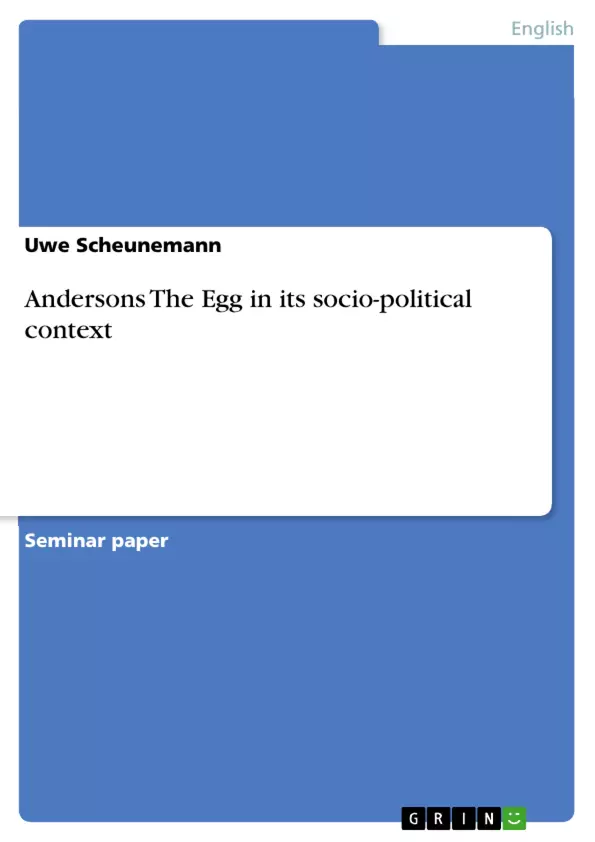Introduction
The role Sherwood Anderson plays in American literature is undoubtedly important and his influence on other authors like Ernest Hemingway or William Faulkner remarkable.
“Winesburg, Ohio” (1919) can be considered as a breakthrough for Anderson. His critical reflection of narrow-minded people and social relations in an American small town, seen through the spectacles of satire, is brilliant.
His short story collection The Triumph of the Egg (1922) followed Winesburg, Ohio and continued this literary style which he is known for today. Nevertheless, one should take a look on Anderson’ s exceptional and unusual biography which stays so much in contrast to the life he describes in his short stories.
If one says that one day might change people’s life, November 28th, 1912 was the day for Sherwood Anderson. On this day he left his job as president of the Anderson Manufacturing Co. including his wife and three little children in order to leave “business for literature [...]” .
Of course this was not a simple decision which he made but the result of many unhappy years and a general disappointment of his life. Not only left he his family and Ohio, with this action he denied a middle-class life and examined the American way to prosperity and success which was omnipresent at that time.
Anderson can also be counted to the lost generation, which Gertrude Stein defined towards Hemingway. The idealism and energy which could be found at the turn to the 20th century was all killed and buried on the battlefields of France, where thousands of Americans lost their life leaving a whole generation of emotional scattered and disillusioned men. Although Anderson did not take part in World War I, he was confronted with the sufferings of the war when he traveled Europe and met Gertrude Stein in Paris. But, one the other hand he got to know French mentality and their intention to overcome war. ‘These are my people’ he wrote in his diary when he came across passionate people full of temperament.
[...]
Inhaltsverzeichnis (Table of Contents)
- Introduction
- Historical facts- America in the Twenties
- The Turn of the century
- The end of war and Harding's “Return to normalcy”
- The New Era, prohibition and the crash in 1929
- the birth of the consumer society
- “The egg” as a modern social satire
- Symbolism of the egg
- Approach to the egg in Anderson's short story
- a story of human defeat- The narrator's father as the archetypal loser
- The mother, her role and the outcome
- the word choice in “The Egg”
- Conclusion
Zielsetzung und Themenschwerpunkte (Objectives and Key Themes)
This text examines Sherwood Anderson's short story "The Egg" within its socio-political contexts, specifically during the 1920s in America. The text aims to analyze the story's themes and symbolism, highlighting Anderson's depiction of American society during this era of rapid change and disillusionment.
- The social and economic transformation of America in the 1920s
- The impact of the First World War on American society
- The rise of consumerism and its influence on individual lives
- The symbolism of the egg in Anderson's story
- The portrayal of the American Dream and its potential failures
Zusammenfassung der Kapitel (Chapter Summaries)
- Introduction: Introduces Sherwood Anderson as a significant figure in American literature and highlights the importance of "Winesburg, Ohio" and "The Triumph of the Egg" in establishing his literary style. Discusses Anderson's personal life and his departure from a conventional middle-class existence in pursuit of literature.
- Historical facts- America in the Twenties: Examines the historical context of Anderson's story by analyzing the major social, economic, and cultural changes in America during the 1920s. This includes the Spanish-American War and its impact on American foreign policy, the rapid industrialization and urbanization of the country, the “Return to normalcy” promised by Warren G. Harding, and the emergence of consumerism and its consequences.
- “The egg” as a modern social satire: Focuses on the interpretation and analysis of "The Egg" as a social satire. This section delves into the symbolism of the egg and its connection to the themes of human defeat, the failure of the American Dream, and the roles of the father and mother in the story. The use of language in the story is also explored.
Schlüsselwörter (Keywords)
This text focuses on the social and cultural context of Sherwood Anderson's short story "The Egg." Key topics include the 1920s in America, the rise of consumerism, the impact of the First World War, social satire, symbolism, and the American Dream.
What is the central theme of Sherwood Anderson's "The Egg"?
It is a modern social satire exploring human defeat, the disillusionment of the American Dream, and the struggles of a small-town family.
What does the egg symbolize in the story?
The egg symbolizes both the fragility of hope and the cycle of futile ambition that leads to the father's failure.
How does the historical context of the 1920s influence the story?
The story reflects the shift toward a consumer society, the "Return to Normalcy," and the underlying disillusionment of the "Lost Generation."
Why is the father described as an "archetypal loser"?
He embodies the failed pursuit of prosperity and success, struggling unsuccessfully to adapt to the changing economic landscape of America.
What was Sherwood Anderson's "breakthrough" work?
"Winesburg, Ohio" (1919) is considered his breakthrough, known for its critical reflection of small-town American life.



